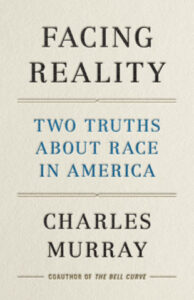
Facing Reality, by Charles Murray (Encounter Books; 168 pp., $25.99). This is a pithy, dispassionate, and elegantly argued little book that applies facts presented in Charles Murray’s earlier, much denser book, Human Diversity, to the political ramifications of the Black Lives Matter insurgency of 2020.
The two truths in the subtitle are easily summarized: The mean black IQ is significantly below that of whites and Asians, and blacks are vastly overrepresented among perpetrators of violent crime.
The political implications of these truths can also be briefly presented. Though we are not yet fully aware of what causes these differences, they play an outsized role in producing racial-group variance in things such as education and income levels. Radical policies that ignore these IQ differences and criminal behavior, or attribute them without evidence solely to prejudice, have no prayer of eliminating the disparate outcomes to which they contribute. Unless, of course, straightforward quota systems without regard for meritocratic qualification are implemented in virtually all spheres of American life.
Such a “solution” is undesirable for realists. It would constitute an implicit endorsement of the hateful and racist idea that blacks are not up to competing on the ground of merit and under impartial standards. It also provides grist for the mills of those interested in nurturing grievances among racial groups disadvantaged by black racial quotas. That progressives cannot or will not see this is a powerful testimony to the blindness provoked by their ideology, which has become a perverse pseudo-religion.
Murray instead makes an unambiguous case for colorblind interactions between individual blacks and whites. He asserts that an “I don’t see race” policy is appropriate for most public interactions. Differences among populations of people, when they matter at all, matter at the level of populations, not at the level of individuals.
Unlike the life outcome of a random member of any racial group, the reception of this book by the race radicals is a matter of nearly perfect predictability. They will not notice how Murray disproves their empty claims about the “racism” of his argument. And they will continue to demand that fundamental aspects of American political principle be thrown out in a revolutionary attempt to achieve an unachievable equity in group outcomes. The only question is whether the rest of us will have the guts to stand up to their assault.
(Alexander Riley)

Pessoa: A Biography, by Richard Zenith (W. W. Norton; 1088 pp., $40.00). For a small country, Portugal has major claims to fame—medieval navigations, rich imperial history, the Great Lisbon Earthquake of 1755, sweetly melancholic fado folk music, and, of course, port wine. We hear less about Portuguese poetry, despite practitioners ranging from the author of The Lusiads, Luís Vaz de Camões, to PEN-prize winning Luís Quintais. Fernando Pessoa (1888-1935) added more to this littoral literature than most, writing so well under four noms-de-plume and in four different styles that Richard Zenith concludes, “One could say that Portugal’s four greatest poets from the twentieth century were Fernando Pessoa.”
Pessoa was reserved in demeanor, respectably bespectacled and bow-tied, and known to his friends as an elegant, if little-published, writer on culture and current affairs. It was only after he died that they realized how prolific he had been. A discovered trunk contained hundreds of never-published poems written under his own name but also under the names of Alberto Caeiro, Ricardo Reis, and Álvaro de Campos, as well as many others.
Pessoa relished mystification. He used almost a hundred noms-de-plume, many with fictional backstories, and often argued in print with his other avatars. This makes his career complicated to follow and any unifying style difficult to distinguish. Pessoa means “person” in Portuguese, but it is challenging to identify any individual at all amongst his many alter egos.
He also left things unfinished, bedevilled as he was by alcoholism, indecision, self-doubt, and superstition. His personality was summed up in the title of the work by which he is best known to Anglophone audiences, The Book of Disquiet (1982). “I’m suffering from a headache and the universe,” was one of his most famous lines.
Zenith shows us a “fanatically private” poet who never married and probably died a virgin. Pessoa claimed aristocratic and Jewish ancestors. Although nominally Catholic, he was interested in occultism and escorted Aleister Crowley around Lisbon.
Although he was later a reactionary, he wrote revolutionary poems in his teens, and as Álvaro de Campos, he was Portugal’s first futurist. Although generally supportive of the dictator António Salazar, he also celebrated rootlessness and defended persecuted Freemasons and homosexuals. All his life he explored; he was a Magellan of the mind. Anglophones are lucky this endlessly inventive bundle of anomalies has now found so assiduous an analyst, revealing a too little-known writer in whose angst and irony we can see many aspects of ourselves.
(Derek Turner)
Leave a Reply